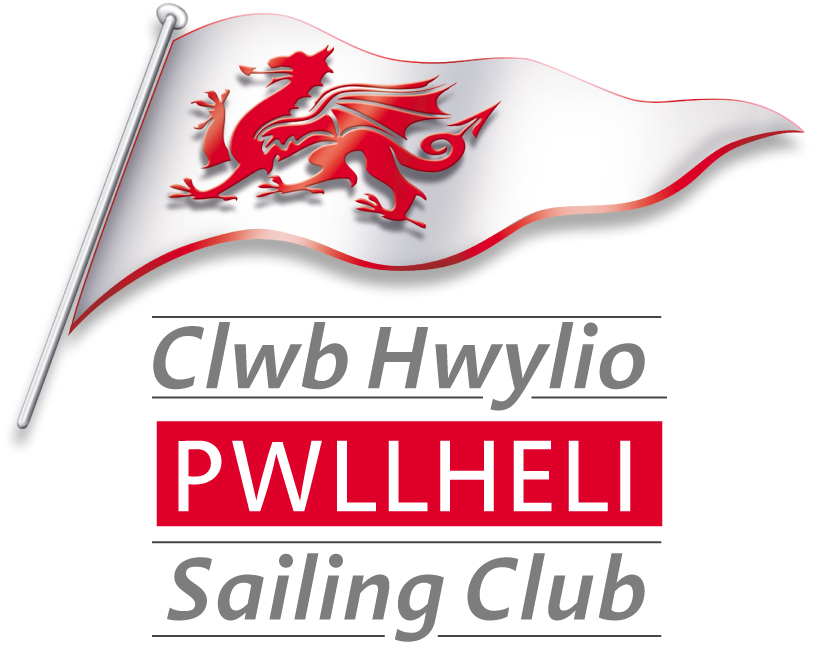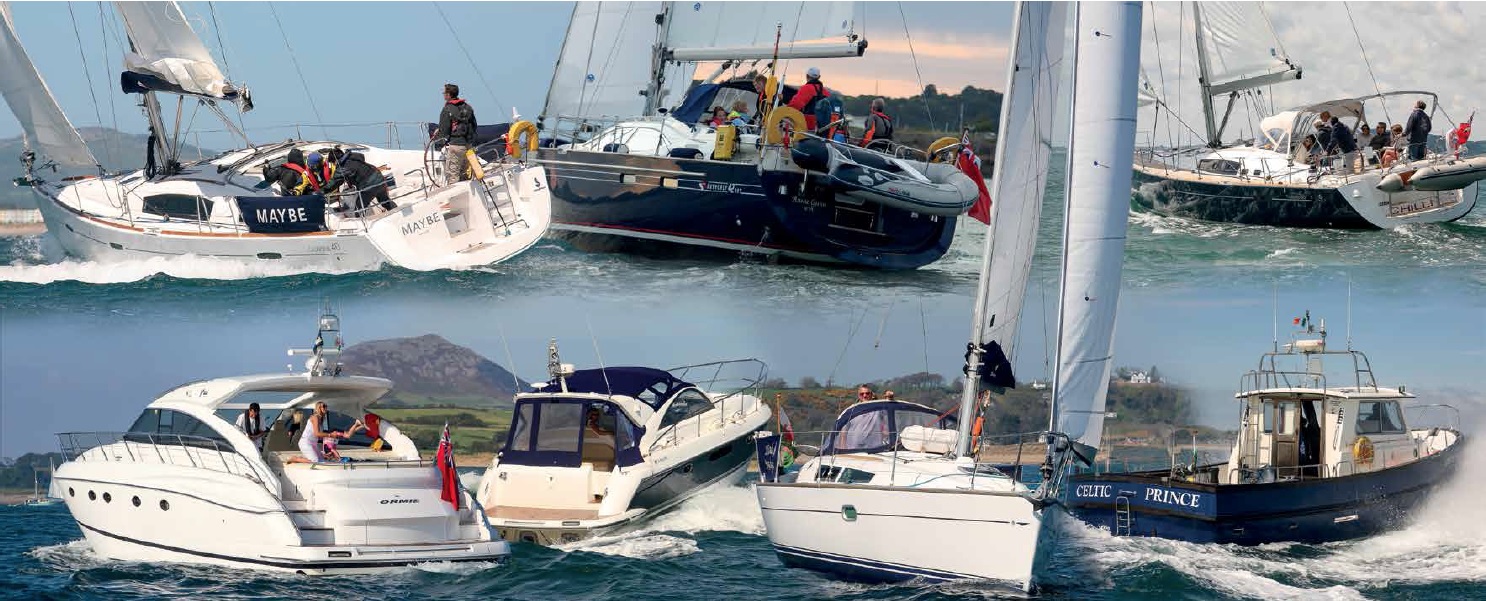The Atlantic
The next part of our journey was going to be without assistance. We had to make sure we were ready to make a three week trip, provision food and water that would last us, fuel to power the generator, gas to cook with, and more importantly we had to prepare ourselves to face what was ahead of us. Only then could we set off for home. What was obvious to both Nerys and myself was that we needed crew to share the burden. We were lucky, since we got two of the best. Ken was 68, a seasoned sailor, had skippered a Swan 46 for many years and was also a RNLI engineer, his sailing CV was enviable. Pete was 65, had chartered a few yachts, still had a rebellious streak and used motorbike boots wrapped in plastic bags for waterproofs. Pete and Ken were old friends and both were keen and mentally prepared for the journey. For Ken it was his love of the sea and the boat, the Frers hull is very similar to the Swan and although she is the poorer cousin in terms of outfitting, she would have the same feel under canvas. For Pete it was the opportunity to sail the Atlantic, a long and private ambition he was running out of opportunities to fulfil, and to do it with someone he knew and trusted made it a trip of a lifetime for Pete. It is important to understand people on a small boat, it is usually the little things that upset the balance and can have drastic consequences. I didn't know Pete, scarcely knew Ken, but within a day of them arriving I was at ease in their company. Ken was energetic, would get on with what needed doing and was at home on the boat. Pete was keen, at ease in any company, learnt quickly and always had a story to tell.
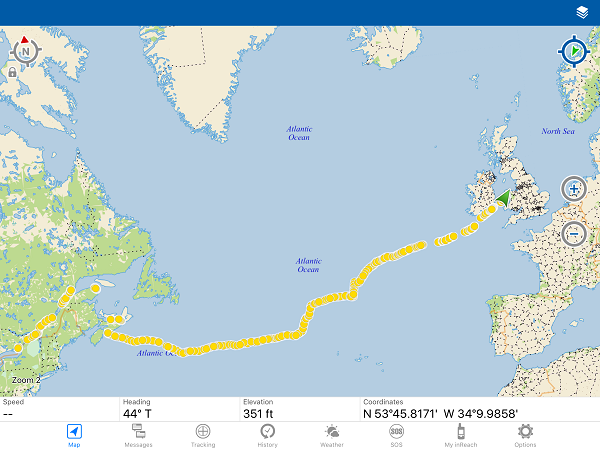
The jib was repaired by Doyles after the thrashing it had, the stitching once again replaced and a UV strip added. The gas tank had been modified to conform to Canadian standards by an elderly gentlemen in his garage somewhere near Luneberg, so that we could fill it. We now had two welded Aluminium gas tanks full for the trip. I had a fine collection of fan belts and filters that I planned not to use and enough oil for the diesel, and generator. Spare diesel, and containers of petrol were stowed in the large cockpit lockers. The inverter decided to pack up when we made the move to Armdale Yacht Club to pick up Pete, and the electrician had replaced it with a battery charger that would turn the generators 120V into 12 V, for some reason this also meant getting a new water heater, but I drew the line at repairing the Eberspaecher diesel fuelled air heater. Both expenses that I could have done without. Once Pete was there I went about checking the rigging, reversing the split pins in the shrouds on the starboard side that had chaffed the sheets, and whilst I was at it I checked the masthead lighting, changed bulb and got spares for everything. Nerys and Ken had been shopping and we had a meal plan based on food deterioration, fresh for the first week, easy food for bad weather, food for snacks and food for long meals we hoped we could prepare and lastly tinned food for the final week. Then we had water, the only real concern I had was water, did we have enough for domestic and drinking. We decided to get enough bottled water to last 3 weeks, it wasn't expensive and we had plenty of space to stow it. The benefit of this plan was that we knew how fast we were using it and knew how much we had left down to the litre. I had replaced both jib halyards before we left Sackets, and now I replaced the main halyard and the staysail halyard, the sheets had been reversed to ease the chaffing on the shrouds the anchor was stowed and the forepeak hatch taped down. Next I rigged the lifelines and went over the liferaft and safety gear. We had done a lot in a week and I was happy, now we just needed the right wind. The only thing I had kept putting off was the self-steering system which would save us being tied to the helm. Personally I like helming, and she was so well balanced a quick lash on the wheel kept her going in the right direction for the time I needed, on my way back to Sackets (from re-rigging her at Niagara on the Lake) she had sailed herself for over an hour as I scrubbed the decks, so it wasn't high on my list. We had our last meal in The Bicycle Thief with Ghost rider tied less than 20 feet away and set off the following morning, all the way to the Royal Nova Scotia Yacht Club to top up the water tanks. Then we were off to sea, slowly motoring out with the sea flat and calm and fog drifting in banks across the entrance. Land was soon left behind and the sails set as we set off to the South East to skirt the Grand Banks, away from the fog, the cold water and the heavy clouds overhead. We kept the VHF on the first day because of its' built in AIS, this gave a plot of all merchant traffic and any other vessel fitted with the system out to 10nm. It uses a lot less power than radar and gives all the information you could want, including the name of the vessel and the ability to talk direct to only that vessel.
The weather was as good as it could be and the last depression had made tracks ahead of us, there was no threat of a hurricane in the Caribbean and I had ten days’ worth of forecast from various sources to determine where I needed to go to keep the wind. The Delorme tracker had been tested and my mate Steve was at the other end of it to help with the forecasting if needed. 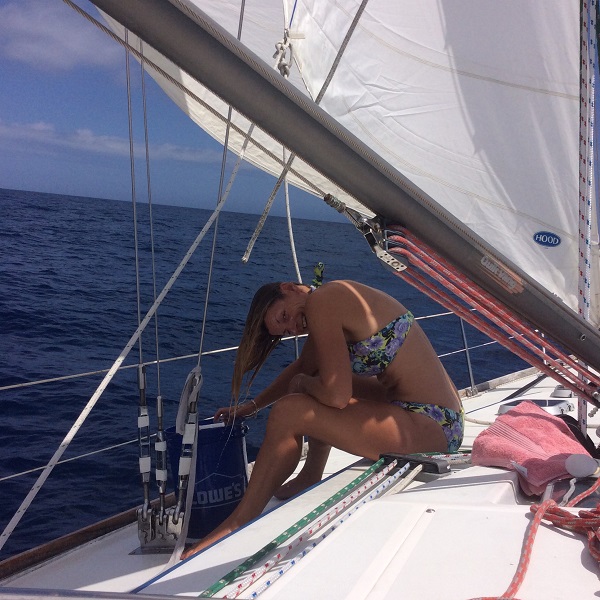
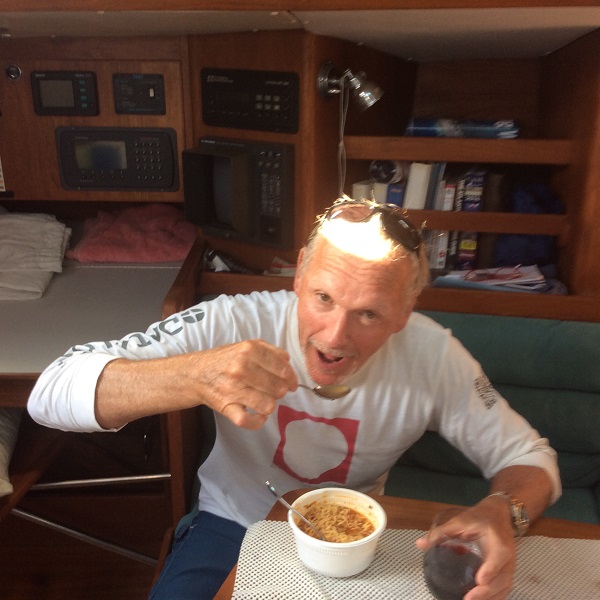
Once off the Grand Banks we turned ENE and made ground towards the Azores, the wind was kind, it was sunny and we were making good time. We could wash ourselves with sea water and dry off in the sun. Read books, sunbathe and generally relax. Now we were at the edge of my weather forecasting and I had to rely on what I could see and the weather service advice. Needless to say I didn't get it one hundred percent right, I wanted wind, but not too much, and we were moving towards the Azores when I really wanted to turn NE towards home. The wind direction meant that where I wanted to go was directly downwind, which we were not well set up for and would be uncomfortable. In the end we got too close to the Azores and should have turned NE sooner, this resulted in two calm periods where we lost pressure and had to motor north to pick up the wind. It was a break from sailing and it was good to have wind over the deck, these days were hot, the sun baked down on us from overhead and forced us to stop and rig a awning over the cockpit. 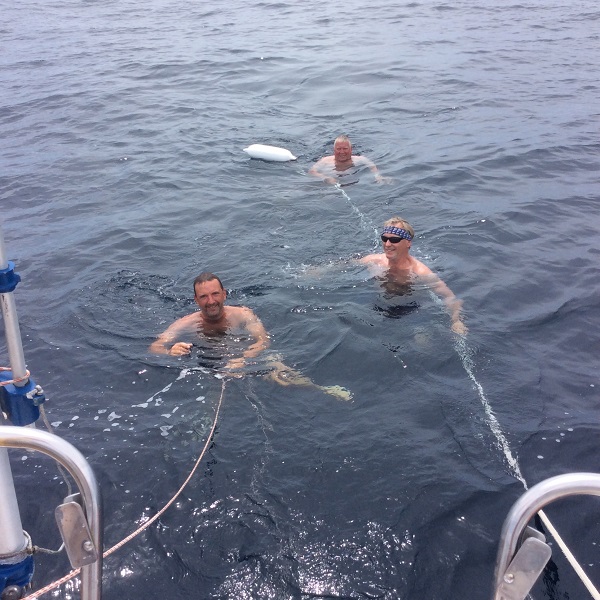
One day later we had a visitor, a very scruffy looking swallow decided to take a break on the guard rail, he was tired from a very long flight and rested for a day before setting off again towards North Africa. Two days later after the second calm period and having regained the wind we were promised the best meal of the trip, Ken was creating a masterpiece of culinary delight on our little stove, then the first gas bottle ran out. It had lasted over two weeks and we had another just like it, so I swapped it out and thought nothing else about it. Ken was true to his word and we had a superb meal, celebrating the fact that now we were making ground towards home. Next morning I was up at four to go on watch with Nerys, I needed coffee so I boiled the kettle and made us both a cup, only the kettle didn't quite boil and on further investigation I discovered both gas tanks were empty. When I had screwed the fitting into the bottle the previous night it had twisted and then unscrewed itself overnight enough to allow the gas to leak out. Luckily we still had a microwave, but only when the generator was on, so we had to combine meal times with the generator running to charge the batteries. Porridge for breakfast, snacks for lunch and Pot Noodles for dinner. Morale took a hit, but we still had wine and beer, and it is surprising what you can do with just a microwave.
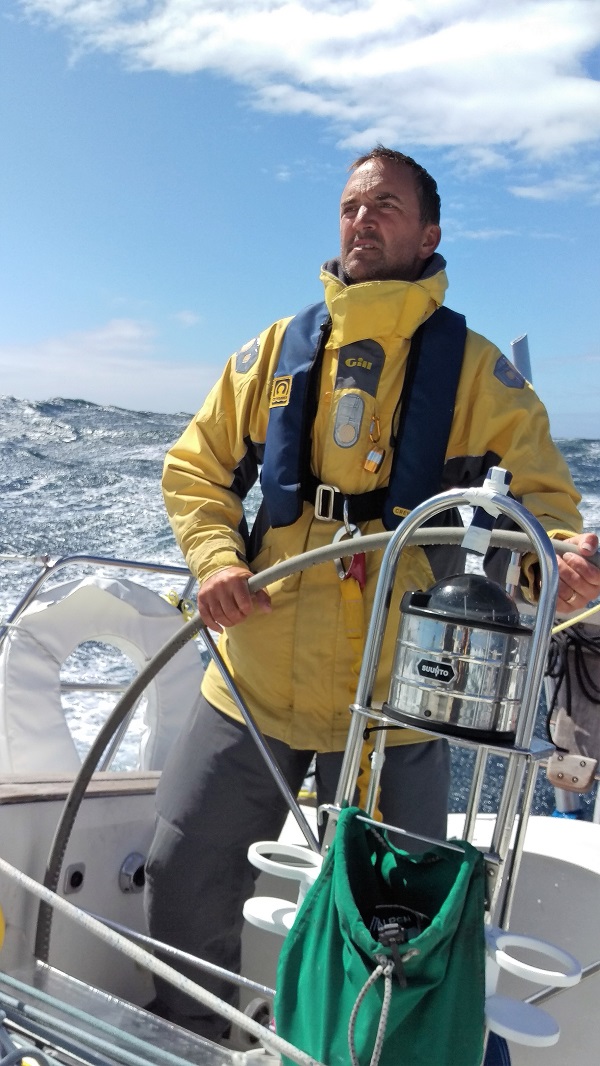 Rob happy in on the helmNow we were on our way home, into the last week, the wind and sea were building as we got further North, there was definitely worst weather coming but I didn't know where from. The route we chose was very deliberate; we wanted to be on the south side of any depression so that we would be running with the weather and not against it. As we approached the Celtic Sea we were up to a Force 6 and I was picked Ken's brains on what shelter we could get if we had to. A quick study of the South Coast of Ireland showed several places we could pull into if needed and put my mind at rest but I kept studying so it would be more instinctive and also because it was the first time I had properly looked at Southern Ireland and I liked what I saw. Steve was sending updates on the weather and we were picking up VHF reports, so now I was happy I knew what was coming, unfortunately it was only getting worse. It was time to shorten sail so we furled the jib and put up the staysail, took down the main and made sure it was secure but ready to go back up on the second reef if we needed it. Lastly I made sure all the hatches were sealed and everything was settled down and lashed and the seacocks closed when not in use. The main problem we had now was to maintain power, since with the weather worsening the generator had to be put in the cockpit and covered with a sail bag in an attempt to keep it dry. The engine could be used, but I didn't want to get past half a tank in case the fuel got too stirred up and I would need it if we decided to take shelter. The entrance to the English Channel would see more merchant traffic converging so we had the VHF on for the AIS plot and any weather reports we could pick up. As chance would have it one ship passed 8nm to the south of us as we turned up towards the Irish coast and to prove what a small world we live in Ken knew one of the cadets embarked and had an emotional half an hour talking to him. We were getting close to home and our spirits soared, not until that moment did I realise how much I was looking forward to getting into Pwllheli. But we still had a way to go, and as confident as I was that we could survive the weather at sea, proximity to land brings its own problems. The wind was still picking up and the little staysail was powering us along at over 8 knots with us surfing down the seas. By now we had all got used to the weather and the waves and the way the boat handled. Pete took this to a new level, he loved being on the helm and before we had shortened sail had an epic watch screaming along for 3 hours without a break and managing to keep the boat steady and fast. Now that we were just on the staysail and the waves were building astern of us, Ken had taken to wedging himself in the bottom of the cockpit to keep him company.
Rob happy in on the helmNow we were on our way home, into the last week, the wind and sea were building as we got further North, there was definitely worst weather coming but I didn't know where from. The route we chose was very deliberate; we wanted to be on the south side of any depression so that we would be running with the weather and not against it. As we approached the Celtic Sea we were up to a Force 6 and I was picked Ken's brains on what shelter we could get if we had to. A quick study of the South Coast of Ireland showed several places we could pull into if needed and put my mind at rest but I kept studying so it would be more instinctive and also because it was the first time I had properly looked at Southern Ireland and I liked what I saw. Steve was sending updates on the weather and we were picking up VHF reports, so now I was happy I knew what was coming, unfortunately it was only getting worse. It was time to shorten sail so we furled the jib and put up the staysail, took down the main and made sure it was secure but ready to go back up on the second reef if we needed it. Lastly I made sure all the hatches were sealed and everything was settled down and lashed and the seacocks closed when not in use. The main problem we had now was to maintain power, since with the weather worsening the generator had to be put in the cockpit and covered with a sail bag in an attempt to keep it dry. The engine could be used, but I didn't want to get past half a tank in case the fuel got too stirred up and I would need it if we decided to take shelter. The entrance to the English Channel would see more merchant traffic converging so we had the VHF on for the AIS plot and any weather reports we could pick up. As chance would have it one ship passed 8nm to the south of us as we turned up towards the Irish coast and to prove what a small world we live in Ken knew one of the cadets embarked and had an emotional half an hour talking to him. We were getting close to home and our spirits soared, not until that moment did I realise how much I was looking forward to getting into Pwllheli. But we still had a way to go, and as confident as I was that we could survive the weather at sea, proximity to land brings its own problems. The wind was still picking up and the little staysail was powering us along at over 8 knots with us surfing down the seas. By now we had all got used to the weather and the waves and the way the boat handled. Pete took this to a new level, he loved being on the helm and before we had shortened sail had an epic watch screaming along for 3 hours without a break and managing to keep the boat steady and fast. Now that we were just on the staysail and the waves were building astern of us, Ken had taken to wedging himself in the bottom of the cockpit to keep him company. 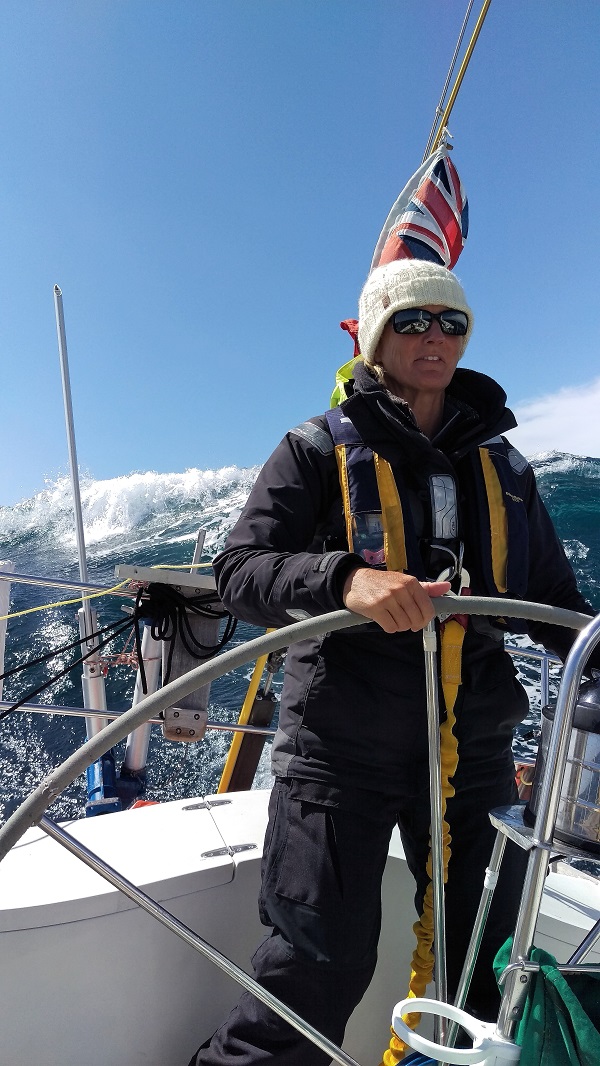 Nerys helming, force 8 waves building up behindAs he kept talking to him Pete saw his eyes get bigger and bigger and start looking further up, above his head. Ken was now telling him to keep looking forward, and although calm he made sure his jacket was sealed and pulled his hood right over his face. Then Pete heard the noise of the wave as it broke and with Pete still looking forward it dumped water right down his back and filled up his boots. Looking out from the cabin, all I saw was Pete's smile. The wind had picked up steadily and from a Force 6 it was now a Force 9 and we were committed to getting past Fastnet, somewhere I hadn't been for quite a while, and it was strange to listen to the coastguard as they gave guidance to a yacht closer in. The wind didn't abate until we got to the Saltee Islands and I was still looking at options to take shelter in Rosslare if something broke, but the wind calmed considerably as we turned the corner and our port tack would take us up towards Enlli. The main was up and the jib out, the staysail packed on deck and we were on the final leg towards Pwllheli. Time for some sleep for me and I went down for a couple of hours with the intention of getting up to make sure we were good for the final approach. I had worked out the tides for Pwllheli before leaving the US, but went over them again before getting some sleep, I was not worried, either we would make the bar or anchor off until we could. When I woke it was obvious I had slept too long, Nerys had seen Enlli and aimed for home, unfortunately this meant the current carried us closer to Aberdaron than I had wanted and it was going to be a push to beat the tide. It was worth it. To see home and sail close to Aberdaron was what it was all for. As we tacked off, the family Harrison were trying to get out to us from the bay in their fishing boat and hanging on tight as they crashed into the sea, but we had to press on to get into the harbour and tacked off and tacked again to make it inside St Tudwals. There we were met with dolphins, the largest we had seen in our whole trip, surfing with us into the bay.
Nerys helming, force 8 waves building up behindAs he kept talking to him Pete saw his eyes get bigger and bigger and start looking further up, above his head. Ken was now telling him to keep looking forward, and although calm he made sure his jacket was sealed and pulled his hood right over his face. Then Pete heard the noise of the wave as it broke and with Pete still looking forward it dumped water right down his back and filled up his boots. Looking out from the cabin, all I saw was Pete's smile. The wind had picked up steadily and from a Force 6 it was now a Force 9 and we were committed to getting past Fastnet, somewhere I hadn't been for quite a while, and it was strange to listen to the coastguard as they gave guidance to a yacht closer in. The wind didn't abate until we got to the Saltee Islands and I was still looking at options to take shelter in Rosslare if something broke, but the wind calmed considerably as we turned the corner and our port tack would take us up towards Enlli. The main was up and the jib out, the staysail packed on deck and we were on the final leg towards Pwllheli. Time for some sleep for me and I went down for a couple of hours with the intention of getting up to make sure we were good for the final approach. I had worked out the tides for Pwllheli before leaving the US, but went over them again before getting some sleep, I was not worried, either we would make the bar or anchor off until we could. When I woke it was obvious I had slept too long, Nerys had seen Enlli and aimed for home, unfortunately this meant the current carried us closer to Aberdaron than I had wanted and it was going to be a push to beat the tide. It was worth it. To see home and sail close to Aberdaron was what it was all for. As we tacked off, the family Harrison were trying to get out to us from the bay in their fishing boat and hanging on tight as they crashed into the sea, but we had to press on to get into the harbour and tacked off and tacked again to make it inside St Tudwals. There we were met with dolphins, the largest we had seen in our whole trip, surfing with us into the bay.
I will never forget the welcome at Pwllheli, thank you to all that were there that day. My only regret was that I was too emotional to speak Welsh, luckily Nerys and Ken made up for it and I could concentrate on opening the champagne and relaxing for the first time in 18 days. It was great to be home and what made it even better was that all four of us felt the same way. As I write this Alex Thompson has just completed the Vende Globe round the world race single handed in 74 days 19 hours, now that really shows what is possible when you put your mind to it.
 Cymraeg
Cymraeg 